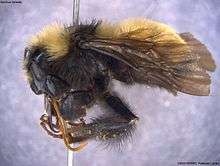Bombus borealis
Bombus borealis is a species of bumblebee known commonly as the northern amber bumblebee.[2][1] It is native to northern North America, where it occurs across Canada and Alaska and the northern and eastern contiguous United States.[1]
| Bombus borealis | |
|---|---|
 | |
| Scientific classification | |
| Kingdom: | Animalia |
| Phylum: | Arthropoda |
| Class: | Insecta |
| Order: | Hymenoptera |
| Family: | Apidae |
| Genus: | Bombus |
| Subgenus: | Subterraneobombus |
| Species: | B. borealis |
| Binomial name | |
| Bombus borealis Kirby, 1837 | |
The queen is 1.8 to 2.2 centimeters long. It has yellow hairs on the body and pale to white hairs on the head. The worker is similar in coloration and measures 1.3 centimeters in length. The male is 1.4 to 1.7 centimeters long.[3]
This species is generally found in woodland habitat. It usually nests underground, and males congregate nearby to seek mates. This species feeds on several plant taxa, including milkvetches, thistles, wild blackberries, goldenrods, comfrey, clovers, and vetches.[1]
References
- Hatfield, R., et al. 2015. Bombus borealis. The IUCN Red List of Threatened Species. Downloaded on 04 March 2016.
- NatureServe. 2015. Bombus borealis. NatureServe Explorer Version 7.1. Accessed 4 March 2016.
- Mitchell, T. B. 1962. Bombus borealis. Bees of the Eastern United States. North Carolina Agricultural Experiment Station Technical Bulletin No. 152. Reprinted at Discover Life.
This article is issued from Wikipedia. The text is licensed under Creative Commons - Attribution - Sharealike. Additional terms may apply for the media files.
